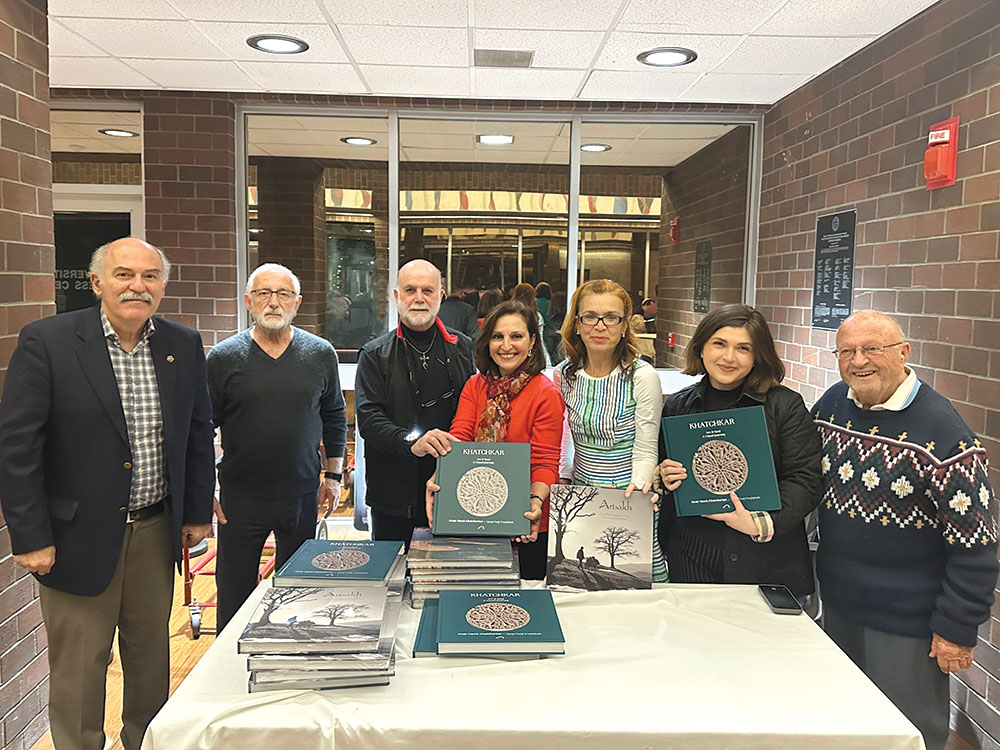Lori Agazarian
Staff Writer
The Fresno State Armenian Studies Program and the Armenian General Benevolent Union, Greater Fresno Chapter, hosted noted photographer Hrair Hawk Khatcherian on Thursday, November 14, to discuss his research on khatchkars and their connection to Armenian culture, art, and history. The lecture, “Khatchkars: Emblematic Art of Armenians,” was part of the Grace and Paul Shahinian Armenian Christian Arts Series at Fresno State, established thanks to the support of Mr. Dean V. Shahinian.
The Armenian Studies Pro-gram held a reception prior to the lecture, with food and conversation, and featuring live music from the Andrew Hagopian Trio (Andrew Hagopian, Jonathan Chardukian, and Michael Mazman).
Khatcherian is an international photographer, who was born in Lebanon, but now lives in Canada. He has traveled to Armenia over 150 times throughout his thirty adventurous years of documenting Armenian culture, photographing monasteries, khatchkars, manuscripts, churches, and so much more. From balancing on rooftops, to hiking miles off the beaten track, Khatcherian has captured the beauty and history of Armenian khatchkars and compared their art and symbolism to Armenian manuscripts and churches.
Khatcherian recently published a book titled Khatchkar: Art & Soul – A Visual Journey, where he shares his photos and compares them to notable manuscripts and miniature paintings. He started his presentation the same way that he began his book, with a quote – “In the beginning, God created the heavens and the earth.” He included an image of a manuscript that depicts the first seven days of God’s creation and followed this with a manuscript depicting the original sin of Adam and Eve. He then compared this to a khatchkar that depicted an image of Eve presenting the fruit to Adam carved on the bottom. There is much biblical influence found throughout all Armenian art, especially khatchkars.
Other examples Khatcherian researched through his photography are the Annunciation manuscript and khatchkar parallel found in the Monastery of Geghard, the Nativity Scene in Etchmiadzin, and multiple crucifixion depictions. A notable crucifixion comparison between manuscripts and khatchkars is “The Sun and Moon,” which features the same symbolism in both works of art. Furthermore, Khatcherian showed a khatchkar where the crucifixion scene is represented with Jesus on the cross, which is very rare, in comparison to other art forms that depict only a cross.
All of Khatcherian’s research and findings have historical meaning and value, and through-out his visits to Armenia, he has seen the changes that recent history has brought to Armenia and its art. Armenia and Artsakh are filled with khatchkars that date back to 866AD and even earlier, as seen in the pagan “dragon stones” that have been converted to khatchkars. With the wars and trauma that Armenia has endured in the last few years, much of Armenia’s art and culture is being destroyed and lost.
Khatcherian visited the village of Lichk in Armenia in 2021 and photographed the many khatchkars. However, when he returned to that same spot in 2023, most of the khatchkars he had photographed had been bulldozed; this is only one example of the loss of Armenia art and culture in recent history.
Khatcherian is researching and documenting the unique and culturally rich beauty of Armenian art and khatchkars. His work is important in preserving the tangible elements of Armenia’s heritage.
Khatcherian’s book Khatchkars is available at: https://naasr.org/products/khatchkar-art-and-soul-a-visual-journey.




